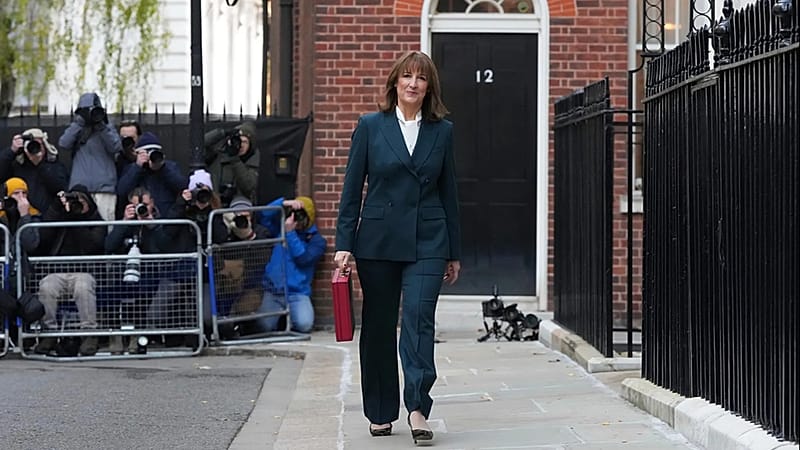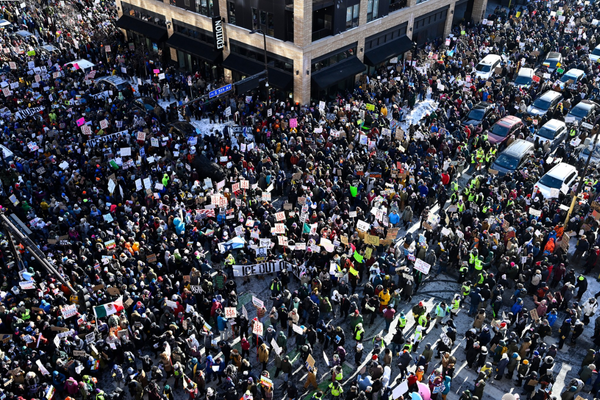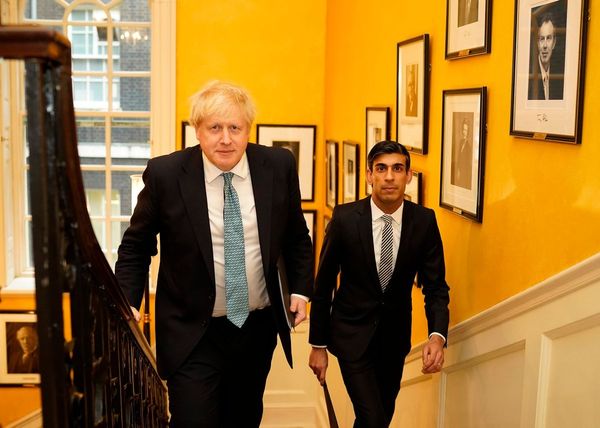
Britain's Treasury chief Rachel Reeves stood up on Wednesday to deliver a crucial tax-raising budget statement to lawmakers following an unprecedented leak from the government's independent forecaster that detailed her measures.
In terms of money raised, the biggest change is that the government will freeze the levels at which earners pay Britain’s different tax levels, meaning that as wages rise, more people fall into higher tax brackets.
Other measures include a mansion tax on high-value properties, changes to the capital gains tax regime, and a cut to tax-free provisions for private pensions.
According to the leak from the OBR, a mistake the organisation has apologised for, the government will raise £26 billion (€30bn) in 2029-30.
The OBR blamed a “technical error” for the leak, saying it went “live on our website too early this morning”. It said it will report to all relevant authorities, including the Treasury, with details on the matter.
"The good news for the beleaguered chancellor Rachel Reeves was that the economic situation painted by the OBR, and the so-called financial ‘black hole’ she faces, is less horrific than many had feared, which was likely the reason a mooted manifesto-busting increase in income tax rates was abandoned," Tom Selby, director of public policy at AJ Bell, commented. He added that "there is still significant pain to be felt by millions of households", after the announcements.
Top announcements and market reaction
The Chancellor is now expected to have £21.7bn of fiscal headroom, a cushion the government has for unexpected costs, according to the Office for Budget Responsibility, which compares with the £9.9bn available in March. The government pledges to fund public services entirely from tax revenues by 2029–30.
The buffer is necessary to reassure financial markets, and based on investors' reactions, Reeves managed to gain trust. According to Hal Cook, senior investment analyst at Hargreaves Lansdown, "the leak of the OBR forecasts caused some volatility" in the bond market, but after the speech, the 10-year was under 4.45%, which is "near the bottom of its range so far in 2025". The leading stock market FTSE 100 index was also 0.6% up following Reeves' speech as the pound gained 0.2% against the US dollar.
Income tax: no rise, but more people will pay more
The Chancellor confirmed that income tax rates will not increase. However, tax thresholds will remain frozen until 2031, an extension of three years, meaning more workers will be pulled into higher tax brackets as wages rise.
Sarah Coles, head of personal finance at Hargreaves Lansdown, said the freeze was acting as an “effective stealth tax”, adding that someone on £50,000 would pay £8,165 more over the period. She said fiscal drag had already brought more than six million extra people into paying income tax, and pushed 3.36 million into higher or additional-rate bands. “We’ve had to hand over an extra £89bn in income tax this year compared with 2021–22 as a result.”
Pensions: Salary sacrifice cap introduced
The government will also limit how much employees can contribute to pensions through salary sacrifice. From April 2029, contributions made this way will be capped at £2,000 a year. The Treasury expects the move to raise £4.7bn in 2029–30 and £2.6bn in 2030–31.
Helen Morrissey, head of retirement analysis at Hargreaves Lansdown, warned the change could “have huge impacts on people’s retirements”. She said a 22-year-old earning £25,000 could see their projected pension pot fall from £283,000 to £226,000 under the new limits. “At a time when there is such a focus on pension adequacy, it seems counterintuitive to put barriers in the way of boosting contributions,” she added.
Savings and dividends: Taxes set to rise
Dividend taxes will increase by 2 percentage points from 2026. Basic-rate taxpayers will see the rate rise from 8.75% to 10.75%, while higher-rate taxpayers will pay 35.75%, up from 33.75%.
Sarah Coles described the change as a “tax attack on dividends” that ran counter to efforts to encourage investment in UK companies. She noted that investors can shelter holdings in ISAs — though these are also changing.
From April 2027, the cash ISA limit will be reduced to £12,000, although the overall allowance will remain £20,000. The remaining £8,000 must be placed in investments such as stocks and shares. Savers aged 65 and over will still be allowed to put the full £20,000 into cash.
Attracting new stock market listings
The Chancellor also announced that newly listed companies will receive a three-year exemption from stamp duty reserve tax in a bid to boost the UK’s attractiveness for initial public offerings (IPOs).
But analysts doubt the move will have a major impact. Amisha Chohan, head of equity research at Quilter Cheviot, said institutional investors typically think “in periods of five years or more”, making temporary relief less effective unless it becomes permanent.
She added that efforts were also needed to prevent existing listed companies from moving abroad or going private. “Removing stamp duty on shares entirely would bring much greater certainty to UK markets and drive more overseas investment,” she said.
Taxes on properties
The government is introducing a ‘mansion tax’ on properties over £2mn, which is coming into play in April 2028. Owners of properties worth more than £2mn will be charged £2,500 annually, and those with properties worth more than £5mn will be charged £7,500.
Mark Hughes, specialist property expert at Pure Property Finance said, "While this is aimed at higher-valued properties, it risks creating liquidity issues for owners who are asset-rich, but when it comes to cash, actually don’t have that much freedom, forcing sales and destabilising the upper end of the market."
Income tax on rental income for landlords will rise by 2% across the board from 2027. According to Coles, the new measure may turn investors away from the property market, while the "move will also be incredibly difficult for renters, who are already wrestling with runaway rents, and could see their monthly costs hiked yet again".
Economic outlook
The UK economy, the world's sixth-largest, isn't doing as well as the Chancellor hoped, with many critics criticising Reeves' decision to slap taxes on business last year. Though there were signs that the economy was improving in the first half of the year, when it was the fastest-growing among the Group of Seven leading industrialised nations, it has faltered again.
"The chancellor faces a delicate balancing act of conveying fiscal stability while advancing the growth agenda," said Peter Arnold, chief economist at consulting firm EY UK.
The OBR now expects the economy to grow by an average of 1.5% over the next five years — 0.3 percentage points lower than it forecast in March.
Weaker GDP growth, alongside higher expected inflation, wages, tax receipts and government spending, has led to a slight worsening of the public finances before any new measures are taken, said the OBR. Borrowing is projected to be £6bn higher, while the current budget surplus falls to £4bn in 2029–30, according to their estimation.
The budget sets out a frontloaded £9bn increase in spending and a backloaded £26bn rise in taxes. According to the OBR, the combination doubles the projected current surplus to £22bn in 2029–30, but leaves debt around 2% of GDP higher than forecast in March.







